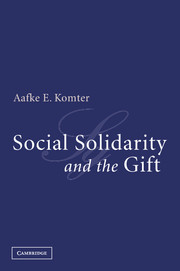6 - Solidarity, Gifts, and Exclusion
Published online by Cambridge University Press: 24 November 2009
Summary
A gift that does nothing to enhance solidarity is a contradiction.
(Mary Douglas 1990: vii)The form of altruism closest to egoism is care of the immediate family. In species after species, we see signs of kin selection: altruism is disproportionally directed at relatives. Humans are no exception.
(Frans de Waal 1996: 212)Informal gift giving acts as the cement of social relationships because it implies a principle of give-and-take or a norm of reciprocity, as we have seen in the preceding chapters. This is why, according to Mary Douglas (1990), gifts essentially contribute to solidarity. In this chapter we regard a certain type of gift as an expression of solidarity. Gifts can be material as well as nonmaterial. For instance, working as a volunteer for the benefit of the community or providing care or help can be considered gifts. But at the same time these are acts of solidarity toward other people. The degree of directness of the solidarity varies with the social distance involved: from the abstract and anonymous giving to charity, to doing voluntary work for a social organization or for some good cause, to offering concrete help or care to people with whom one is personally involved. As gift giving is more abstract and anonymous, reciprocity will be less. The more familiar one is with the recipient of the gift, the more a form of reciprocity is to be expected.
- Type
- Chapter
- Information
- Social Solidarity and the Gift , pp. 123 - 143Publisher: Cambridge University PressPrint publication year: 2004

